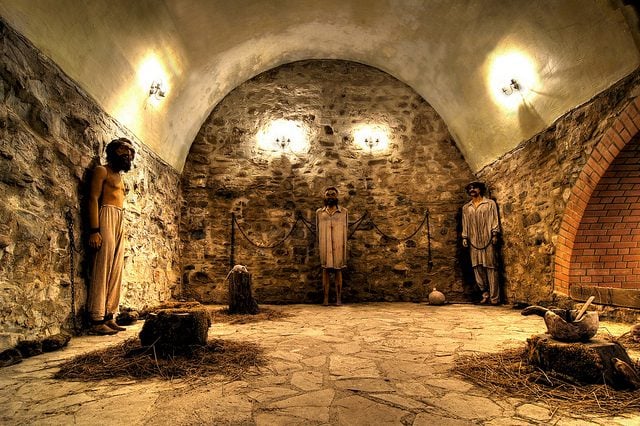
Epiphany 5B — Mark 1:29-39
When the people most sought him, Jesus ran away.
When the people finally got an inkling, a glimpse of who he was, Jesus disappeared.
When people at last realized that there was something different about this teacher and healer, Jesus vanished, eager almost in his need to be absent and alone.
Unwilling to be found, to be known, to be contained or owned.
This, of course, isn’t the same Jesus we learn of in Sunday School, the Jesus who says that all who seek him will find him. Rather, his actions in the gospel of Mark seem to say that the more we seek him the more quickly we will lose him.
In the gospel of Mark, Jesus was always silencing those that would name him as the son of God, always escaping the crowds who sought his voice, his good news, his healing presence.
In this week’s text, after performing some powerful miracles in the community, the townspeople began to seek him.
So what did he do?
Stay and develop more disciples?
Build a new synagogue?
Develop communities of hope and justice?
Start a committee?
Institutionalize?
No, he escaped. In the early morning hours while it was still dark, while everyone was sleeping, dreaming perhaps of seeking and finding this great, mysterious, miraculous teacher who held hope and power in the palms of his hands, Jesus disappeared into the ether.
Imagine what it must have been like that morning to awaken to the entire town knocking on your door and asking where your Lord is. And all you can say is, “I don’t know.”
When his disciples at last hunt him down, they breathlessly call him back to the town and away from a deserted place of prayer.
“Everyone is searching for you,” they shout. “Everyone!”
Perhaps the disciples finally saw the promise of their initial calling come to fruition. They saw their fishing nets full of people. They glimpsed the possibilities of the Reign of God. They tasted power and influence, and they liked it.
“Come! Everyone is looking for you.”
But instead of going back to heal the hurting, increase his following, teach the masses eager for his messages, he skipped town.
“Come let us go on to the neighboring towns to proclaim the message there,” Jesus says.
In fact, in the Greek, Jesus couldn’t be more clear that he was trying to sneak away. He tells the disciples not just to go to neighboring towns, but to go to neighboring towns by another way, an uncommon way.
Jesus, it seemed, didn’t want to be followed.
Now, I know there are political reasons in Mark’s gospel why he resists a large following and being a known leader around the countryside. In an occupied territory, power and popularity are the quickest roads to making oneself a target of an empire.
But, to be honest, most of my life, it is this elusive, slippery Jesus in Mark’s gospel that I have encountered, rather than the Jesus of our traditions that tell us he can be found always if only we seek him or that he will be with us always, never leaving or forsaking.
The Jesus I have experienced is the one that disappears just as I begin to glimpse him. The more I seek this Jesus the more elusive — frustrating, maddening, wild, homeless — he becomes.
That’s why I think one of the best descriptions of Jesus comes not from the world of theology but from the world of fiction. Flannery O’Connor’s off-kilter street preacher in Wise Blood, Hazel Motes, talks of Jesus this way:
“Later he saw Jesus move from tree to tree in the back of his mind, a wild ragged figure motioning him to turn around and come off into the dark where he was not sure of his footing, where he might be walking on the water and not know it and then suddenly know it and drown. Where he wanted to stay was in Eastrod with his two eyes open, and his hands always handling the familiar thing, his feet on the known track …”
The farther down the Way I follow, the more the figure of Jesus seems to dissipate, hiding behind trees and calling to me from and calling me into the darkness, where little is familiar, where footing is unsure, and where faith isn’t belief but the courage simply to keep following this Jesus who is always just out of reach, who is always leaving us, beckoning us, vanishing from us when we finally get a sense of who he is.
Come deeper with me into the wilderness, he says.
Let’s get there by another way, a way you’ve yet to imagine can even be real, all of it far, far away from the familiar things.
I can’t help but wonder what it must of been like for the people of that town who might have missed out on Jesus’ cameo of miracles. What they must have thought when they woke, to ask, seek, and knock on the door of the great healer, only to find no one knew where he was.
Perhaps it was a just a dream? one old man might say.
Was he a ghost? a young child might ask.
Can we even remember what his face looks like? a mother might say. “So caught up were we in the faces of each other, healed, restored, and weeping.
Perhaps that is the point. Once Jesus comes into our lives, and leaves, he can no longer be found in a single individual person’s experience.
Rather we — and he, really — become liberated so that Jesus may be found everywhere and in everything, in all our faces, in all our bodies, in all our communities.
Jesus becomes absent so that we might experience the present. Jesus vanishes so we can resist the temptation to idolize him. Jesus disappears so that we can find him, so that we can find ourselves, but most of all so that we can find each other through him.
At the break of day, when those that seek him find him missing, the longing, the ache of absence, the burning the lingers in their hearts will bind them together as he never could by being fully present, by being the central focus.
They might seek to hunt him down. They might seek to memorialize him. They might seek to enact his generosity in their own lives. Whatever their decision, and how they respond, what will join them together is the absence.
That’s the paradox of the kind of community Jesus creates. It is founded not on us having found him. Rather, it is founded in his absence, his once-and-future presence, his maddening vanishing act.
Seek, Jesus says, and you will find.
Only what we find is a deep, loving and generative absence that binds.
(This is an edited and updated version of a reflection written in 2010 and published on this blog in 2012. This is not a sermon, but a reflection.)











